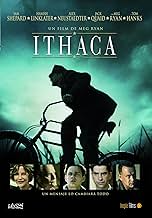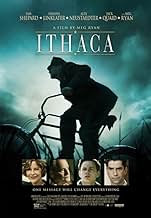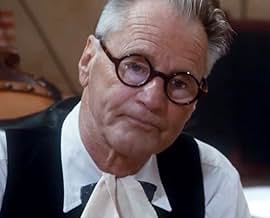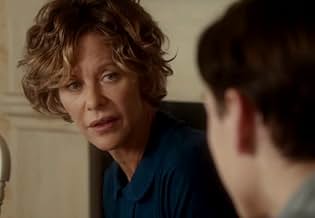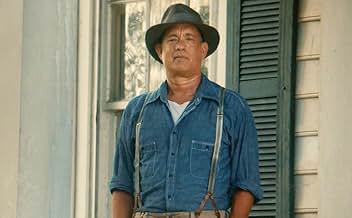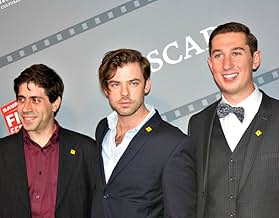CALIFICACIÓN DE IMDb
5.5/10
3.3 k
TU CALIFICACIÓN
Homer Macauley, mensajero de telegramas, cumple 18 años en el verano de 1942 mientras su hermano mayor está en la guerra.Homer Macauley, mensajero de telegramas, cumple 18 años en el verano de 1942 mientras su hermano mayor está en la guerra.Homer Macauley, mensajero de telegramas, cumple 18 años en el verano de 1942 mientras su hermano mayor está en la guerra.
- Premios
- 2 nominaciones en total
- Dirección
- Guionistas
- Todo el elenco y el equipo
- Producción, taquilla y más en IMDbPro
Opiniones destacadas
It shows the innocence of a younger son, an older son grown up, and a middle son Homer becoming aware of what real life is as he delivers telegrams to the mothers of sons who will not be coming back home from the war alive. Homer grows up as he sees the pain of life.
An old man named Will Grogan receives and types the telegrams. Mr. Grogan drinks to help deal with his pain of sending this information to families in the community.
The movie shows us how war may effect us. It makes you realize the front line of war can be just as difficult at home as they try to continue with life.
An old man named Will Grogan receives and types the telegrams. Mr. Grogan drinks to help deal with his pain of sending this information to families in the community.
The movie shows us how war may effect us. It makes you realize the front line of war can be just as difficult at home as they try to continue with life.
Meg Ryan did an awesome job directing this movie. I was pleasantly surprised by the characters, the cinematography, lighting and superb story line. So many movies are predictable with the same dramas, with the same cliches while this one had a fresh approach. The feeling of the small town with divisions, logistics of war, the telegraph business of the time, the youth becoming an adult in ways so different than most films was captured with beautiful motion. The actors had real approach, timing and freshness. All in all, a wonderful movie.
It is a film deserving to be loved. This is the main certitude about it. It deserve be loved for the beautiful portrait of mister Grogan proposed by Sam Shepart. For lovely young Spencer Howell. For the hard ( and good ) work of Alex Neustaedter. And, obvious, for Meg Ryan . Yes, it is not the most convincing movie about war. No doubts, it is a sketch only. The mother, performed by Meg Ryan remains a silhouette, unfortunately. But, honest to be, it represents more, more than a good try. It is a film to remind small, fundamental things defining us. From the connections between siblings to the maturity of a 14 years old age boy. From friendship to the telegrams, death, war and change of everything just in a minute. Its sins - many, maybe. Its basic virtue - an admirable delicacy for I am profound grateful to Meg Ryan.
Greetings again from the darkness. The source material is the 1943 novel "The Human Comedy" from Pulitzer Prize winning writer William Saroyan; and it's the directorial debut of Meg Ryan, the one-time 'America's Sweetheart' who reunites with her Sleepless in Seattle co-star Tom Hanks (in a ghostly cameo). Due to these juicy ingredients, we can be excused if our expectations are a bit high.
As a viewer, it's easy to relate to the emotions of young Homer McCauley (Alex Neustaedter) as his messenger job expedites the disillusionment that often accompanies adulthood. While Homer becomes more disenchanted the more he learns, we feel let down with each successive sequence. The adapted screenplay from Eric Jendresen never picks a direction, and instead teases us with numerous pieces from the novel with little follow through on any.
Homer's dad (a very brief Tom Hanks apparition) has recently passed, and with his older brother Marcus (Jack Quaid, son of Meg Ryan and Dennis Quaid) off at war, Homer takes it upon himself to secure a job to help support his saintly and melancholy mother (Meg Ryan), his older sister Bess (Christine Nelson) and his little brother Ulysses (an energetic Spencer Howell). He pledges to be the best bicycle messenger ever when hired at the local telegraph company run by Tom Spangler (Hamish Linklater) and old-timer (grumpy and frequently inebriated) Willie (Sam Shepard).
Being that it's war time, some of the telegraphs Homer must deliver are the worst possible news for the parents on the receiving end. As the film progresses, we see the light slowly go out of Homer's once bright eyes. The accelerated coming-of-age aspect is at its best when his father-figure Willie brusquely tells him "You are 14 years old and you're a man! I don't know who made you that way." It's the most poignant moment of the film and the closest we get to a real theme.
The letters Homer receives from older brother Marcus contribute to his understanding of the world and the reading of the letters serves the purpose of story narration. The film is nostalgic and idealistic, but so unfocused that we are never able to fully connect with any of the characters. We are caught off guard when Homer proclaims his mother as the nicest person ever, although she has offered even less guidance than Forrest Gump's mom. Ithaca, Ulysses, and Homer we can't miss the mythology ties, as well as the importance of home, but it always feels like something is missing.
In 1943, six time Oscar nominee Clarence Brown made a movie based on this same novel, and the cast included Mickey Rooney, Frank Morgan, Donna Reid and Van Johnson. In this new version, John Mellencamp provides the musical score, and Ms. Ryan has stated that the novel helped her work through a difficult time in her personal life. She's likely to get more opportunities to direct; her first outing is easy enough to watch, but just as easy to forget.
As a viewer, it's easy to relate to the emotions of young Homer McCauley (Alex Neustaedter) as his messenger job expedites the disillusionment that often accompanies adulthood. While Homer becomes more disenchanted the more he learns, we feel let down with each successive sequence. The adapted screenplay from Eric Jendresen never picks a direction, and instead teases us with numerous pieces from the novel with little follow through on any.
Homer's dad (a very brief Tom Hanks apparition) has recently passed, and with his older brother Marcus (Jack Quaid, son of Meg Ryan and Dennis Quaid) off at war, Homer takes it upon himself to secure a job to help support his saintly and melancholy mother (Meg Ryan), his older sister Bess (Christine Nelson) and his little brother Ulysses (an energetic Spencer Howell). He pledges to be the best bicycle messenger ever when hired at the local telegraph company run by Tom Spangler (Hamish Linklater) and old-timer (grumpy and frequently inebriated) Willie (Sam Shepard).
Being that it's war time, some of the telegraphs Homer must deliver are the worst possible news for the parents on the receiving end. As the film progresses, we see the light slowly go out of Homer's once bright eyes. The accelerated coming-of-age aspect is at its best when his father-figure Willie brusquely tells him "You are 14 years old and you're a man! I don't know who made you that way." It's the most poignant moment of the film and the closest we get to a real theme.
The letters Homer receives from older brother Marcus contribute to his understanding of the world and the reading of the letters serves the purpose of story narration. The film is nostalgic and idealistic, but so unfocused that we are never able to fully connect with any of the characters. We are caught off guard when Homer proclaims his mother as the nicest person ever, although she has offered even less guidance than Forrest Gump's mom. Ithaca, Ulysses, and Homer we can't miss the mythology ties, as well as the importance of home, but it always feels like something is missing.
In 1943, six time Oscar nominee Clarence Brown made a movie based on this same novel, and the cast included Mickey Rooney, Frank Morgan, Donna Reid and Van Johnson. In this new version, John Mellencamp provides the musical score, and Ms. Ryan has stated that the novel helped her work through a difficult time in her personal life. She's likely to get more opportunities to direct; her first outing is easy enough to watch, but just as easy to forget.
I would caution the reader to not take too much stock in the less- than-stellar, Monday morning director, critical reviews of this film. Tom Hanks' position in the billing should be the very last, if even noted. His face time in this movie is probably less than 2 minutes total and, for all intents and purposes, Meg Ryan's character is minor. Any decent character actress could have played her role without any impact on the motion picture as a whole. This is not "Sleepless In Seattle" nor is it a spin-off of any other Meg Ryan or Tom Hanks movie. These two "box office draws" are in this motion picture because as producer (Hanks) and director (Ryan) they chose to be; perhaps for the purpose of giving this film initial gravitas or simply because they wanted to be participants in the telling of a good story and a good story this is.
This is a time-period piece conceived by William Saroyan in 1942 and published as the novel, "The Human Comedy" in 1943. Everything about this film is 1942 perhaps with the exception of the lack of recognizable, vintage 1940's music. This is a film depicting the morals and values of small town America at the beginning of the Second World War, not the values, morals, or expectations of those of us trapped so much in the present that we cannot recognize or even acknowledge the simple and far more innocent times portrayed in this film. Consequently, the gratuitous profanity so common in pictures today is refreshingly absent. This was a time when to be able to kiss a cute girl on her cheek was considered something very special to a young man heading off to war. It was a time when a little boy could get lost in town and the only real threat was that he might miss dinner. People did not lock their doors. A telegraph messenger, even though a stranger, was invited into one's home. If a person was involved in a nefarious or unseemly behavior they did their best to hide it. It was a time when a typical 14 year-old boy, like Homer Macauley (Alex Neustaedter), having experienced the Great Depression first hand, was already a responsible individual.
This was the world in which Homer rode his bicycle, delivering telegrams, picking up night letters, and doing everything he could to see that the Postal Telegraph Company could effectively compete with Western Union; all the while being the one remaining "man of the house" in the wake of his father's untimely death and his older brother's departure for service overseas. Ithaca and the nation were slowly adjusting to war as the patriotic zeal following Pearl Harbor gave way to the more sobering realities of life during wartime. The presence of a telegraph messenger at the front door was not yet perceived as a sign of bad news but those in the telegraph business, transmitting, decoding, and delivering the messages, were becoming keenly aware of the war's growing, painful impact on families. In this context, with the war's presence being increasingly felt and experienced, the small day-to-day aspects of community were the constants, giving the character of Homer's 4-year old brother, Ulysses (Spencer Howell), the unique ability to provide an endearing presence of those things that are ultimately important and reminding us that, even when things appear to be going so very badly, life is good and must go on.
Screenwriter Erik Jendresen says in his synopsis of the story line, "this is a coming-of-age story." In my view it is far more than that if, in watching the film, one will allow being transported to Ithaca, NY in 1942 and to embrace for 90 minutes or so, the values of the people living through this story at that time.
This is a time-period piece conceived by William Saroyan in 1942 and published as the novel, "The Human Comedy" in 1943. Everything about this film is 1942 perhaps with the exception of the lack of recognizable, vintage 1940's music. This is a film depicting the morals and values of small town America at the beginning of the Second World War, not the values, morals, or expectations of those of us trapped so much in the present that we cannot recognize or even acknowledge the simple and far more innocent times portrayed in this film. Consequently, the gratuitous profanity so common in pictures today is refreshingly absent. This was a time when to be able to kiss a cute girl on her cheek was considered something very special to a young man heading off to war. It was a time when a little boy could get lost in town and the only real threat was that he might miss dinner. People did not lock their doors. A telegraph messenger, even though a stranger, was invited into one's home. If a person was involved in a nefarious or unseemly behavior they did their best to hide it. It was a time when a typical 14 year-old boy, like Homer Macauley (Alex Neustaedter), having experienced the Great Depression first hand, was already a responsible individual.
This was the world in which Homer rode his bicycle, delivering telegrams, picking up night letters, and doing everything he could to see that the Postal Telegraph Company could effectively compete with Western Union; all the while being the one remaining "man of the house" in the wake of his father's untimely death and his older brother's departure for service overseas. Ithaca and the nation were slowly adjusting to war as the patriotic zeal following Pearl Harbor gave way to the more sobering realities of life during wartime. The presence of a telegraph messenger at the front door was not yet perceived as a sign of bad news but those in the telegraph business, transmitting, decoding, and delivering the messages, were becoming keenly aware of the war's growing, painful impact on families. In this context, with the war's presence being increasingly felt and experienced, the small day-to-day aspects of community were the constants, giving the character of Homer's 4-year old brother, Ulysses (Spencer Howell), the unique ability to provide an endearing presence of those things that are ultimately important and reminding us that, even when things appear to be going so very badly, life is good and must go on.
Screenwriter Erik Jendresen says in his synopsis of the story line, "this is a coming-of-age story." In my view it is far more than that if, in watching the film, one will allow being transported to Ithaca, NY in 1942 and to embrace for 90 minutes or so, the values of the people living through this story at that time.
¿Sabías que…?
- ErroresWhen they are in the cinema watching the newsreel, there's a shot of a man carrying a wounded solider across a river. The commentary states "when this country was extending a helping hand."
That shot is actually of an Australian soldier helping a wounded Australian in the Kokoda campaign in New Guinea. The film is footage from Kokoda Front Line, by Damian Parer, who was an Australian combat camera man.
- Citas
Mrs. Macauley: There will always be pain in this world, Homer. And a good man will seek to take the pain out of things.
Selecciones populares
Inicia sesión para calificar y agrega a la lista de videos para obtener recomendaciones personalizadas
- How long is Ithaca?Con tecnología de Alexa
Detalles
- Fecha de lanzamiento
- País de origen
- Sitio oficial
- Idioma
- También se conoce como
- Thành Phố Ithaca
- Locaciones de filmación
- Productoras
- Ver más créditos de la compañía en IMDbPro
Taquilla
- Presupuesto
- USD 5,000,000 (estimado)
- Tiempo de ejecución1 hora 36 minutos
- Color
- Relación de aspecto
- 2.35 : 1
Contribuir a esta página
Sugiere una edición o agrega el contenido que falta

Principales brechas de datos
By what name was Ithaca (2015) officially released in India in English?
Responda

